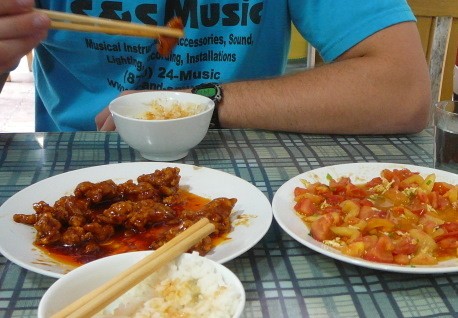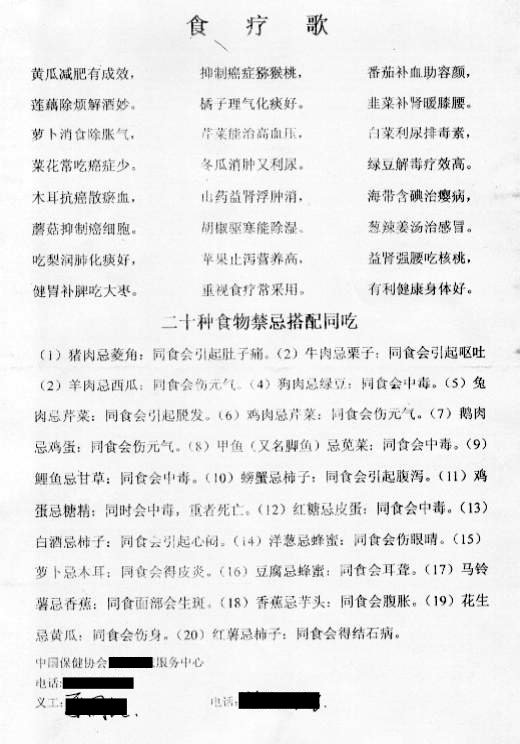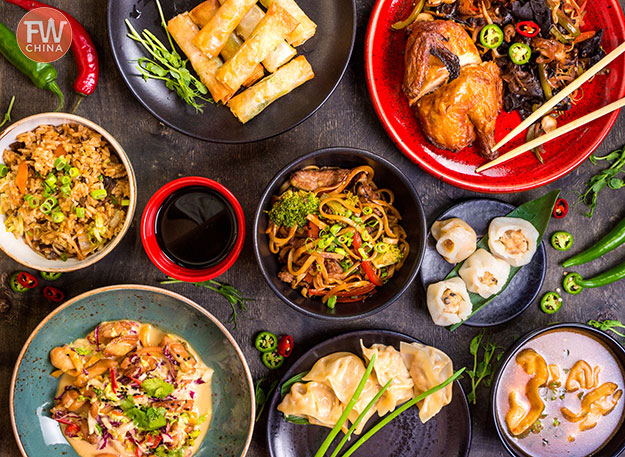20 Dangerous Food Combinations (according to Chinese tradition)
Ever wonder why you went bald? Do you ever find yourself with a decreased vigor for life and can’t explain why? Did you suddenly go deaf without any prior symptoms? How about an unexpected bloated belly or an intense case of diarrhea? It may be that you had some dangerous food combinations…or at least so says Chinese tradition.

Yesterday morning here in Xinjiang, China I had a lovely little surprise sitting on my desk…
…a peculiar health notice from our local health center.
I was about to throw it away when I noticed the title that had me instantly hooked: 20 Foods Which Shouldn’t Be Eaten Together.
If you’re curious what Chinese traditions says are the dangerous food combinations, you’ll find this interesting.
Foods Which Shouldn’t Be Eaten Together
For those who read Chinese, here’s what the health notice describing the dangerous food combinations looked like:

Since most people likely won’t understand what’s being said, I’d like to translate these 20 food combinations for you.
This includes not only the foods, but also the purported effects.
Note: This is not a joke. These health officials are completely serious and this notice was passed around the city in hopes that people would think twice before eating these foods together.
Heaven forbid you serve rabbit meat and celery in the same meal.
Apparently, all your guests would walk away bald.
I’m doing you a favor here, so you might want to take some notes.
1. Pork and Water Chestnuts
Food Combination Result: A stomach ache
China loves to eat pork, and they also love their nuts.
Unfortunately, this dangerous food combination means that you might walk away with a serious stomach ache.
2. Beef and Chestnuts
Food Combination Result: Vomiting
It seems as though meet and nuts just don’t go together well.
I’ve vomited while eating Chinese meat before, but I don’t think it was because I had chestnuts.
I think the meat was bad.
3. Lamb Meat and Watermelon
Food Combination Result: Decreased vigor for life.
This one is quite interesting considering how much the people of Xinjiang love lamb kebabs and how popular watermelon is.
But how do you measure a “decreased vigor for life”? It sound like depression to me.
4. Dog Meat and Green Beans
Food Combination Result: Poisonous to the body
If you’re eating dog meat, I think you have bigger problems to deal with right now.
It’s not unheard of in China, though, so this health notice thought it necessary to point out that dogs and green beans don’t go well together.
5. Rabbit Meat and Celery
Food Combination Result: Loss of Hair
Rabbits may love celery, but apparently this combination of vegetable and “hare” doesn’t bode well for your “hair”.
Get it? :)
Rabbit meat is actually quite popular in China, especially outside the big cities, so this combination seems quite plausible.
As for going bald…I’m not so sure.
6. Chicken and Celery
Food Combination Result: A decreased vigor for life.
Where are they coming up with this stuff?
Pretty much every chicken salad in the west combines chicken with celery and other vegetables and as a whole we’re not…
…well, I guess we are a pretty depressed nation.
Who knows. Maybe this is true and I should stop eating that delicious chicken salad sandwhich.
7. Goose Meat and Chicken Eggs
Food Combination Result: A decreased vigor for life.
I’d like to see a recipe that calls for a combination of goose meat and chicken eggs. I don’t think it exists.
Still, beware of depression.
8. Turtle Meat and Amaranth
Food Combination Result: Poisonous to the body.
I had to look this up. Amaranth is a nutritional herb that we don’t often use in the west.
Believe it or not, I did attend a wedding in China that served turtle, though. Shell and everything.
9. Carp and Liquorice
Food Combination Result: Poisonous to the body.
No, we’re not talking about the candy licorice here. Liquorice is a root from which a sweet flavor can be extracted.
So apparently fish and sweets are a dangerous food combination.
10. Crab and Persimmon Fruit
Food Combination Result: Diarrhea.
Yikes. Might want to avoid this one.
China loves to include crab in its famous hot pot dishes and I’ve never been to a Chinese restaurant that didn’t serve fruit as a dessert.
11. Chicken Eggs and Saccharin
Food Combination Result: Poisonous to the body, potentially fatal.
Saccharin just seems like one of those substances that just shouldn’t be eaten period.
It’s been linked to obesity, cancer and isn’t recommended for pregnant women.
And now, it’s potentially fatal.
12. Brown Sugar and Preserved Eggs
Food Combination Result: Poisonous to the body.
Personally, I try to avoid preserved eggs as a general rule.
In China, however, these eggs known as “1,000 year eggs” or century eggs are quite popular.
13. White Wine (白酒) and Persimmon
Food Combination Result: Chest Pains.
In my experience, white wine by itself causes chest pains. This “bai jiu” is a kind of Chinese alcohol that is unbelievably strong.
According to Chinese tradition, though, it’s even worse if you drink it while eating persimmon.
14. Onions and Honey
Food Combination Result: Damanged vision.
As with many of these dangerous food combinations, it’s hard to see where these two items might be mixed together.
Still, somehow China has linked onions and honey with vision impairment.
15. Radish and Fungus
Food Combination Result: Dermatitis (a skin disease).
For most westerners, the thought of eating a “fungus” is absurd. Yet this is the literal translation for the word on this health notice.
Usually, this is referring to a kind of mushroom that China likes to eat stir-fried.
16. Bean Curd and Honey
Food Combination Result: Makes you deaf.
What’d you say? I can’t hear you because I ate bean curd and honey last night.
Bean curd is a kind of food that often gets referred to as tofu. It has very little taste, but it’s commonly used in Chinese cuisine.
17. Potatoes and Bananas
Food Combination Result: Freckles.
In case you were curious, freckles are not considered “cute” in China. Very few Chinese people have freckles.
The thought of eating a potato and banana together and contracting the terrible freckles disease would be a horror to most Chinese.
18. Bananas and Sweet Potatoes
Food Combination Result: A bloated belly.
It seems common sense to me that if you eat too many bananas and sweet potatoes together, you’d get bloated.
That’s exactly how I feel after Thanksgiving dinner. Perhaps that has to do with the sweet potatoes?
19. Peanuts and Cucumbers
Food Combination Result: Harmful to the body.
It’s unclear exactly what kind of harm we’re talking about here, but it was enough to warrant inclusion on this list.
20. Sweet Potatoes and Persimmon
Food Combination Result: lithiasis (formation of stones, such as the kidney stone).
I don’t want kidney stones. Do you?
Then don’t eat sweet potatoes and persimmon together.
In fact, based on this list, it seems like persimmon is a fruit worth eliminating from your diet altogether.
Final Thoughts | Dangerous Food Combos
So the question remains for me…
…how much of this should I take to heart? Any ideas?
There are plenty of dieticians who warn against certain dangerous food combinations, but I’m not sure they would agree with this traditional Chinese list.
Still, it was an official health notice that I received while working in Xinjiang, China. That has to mean something!











